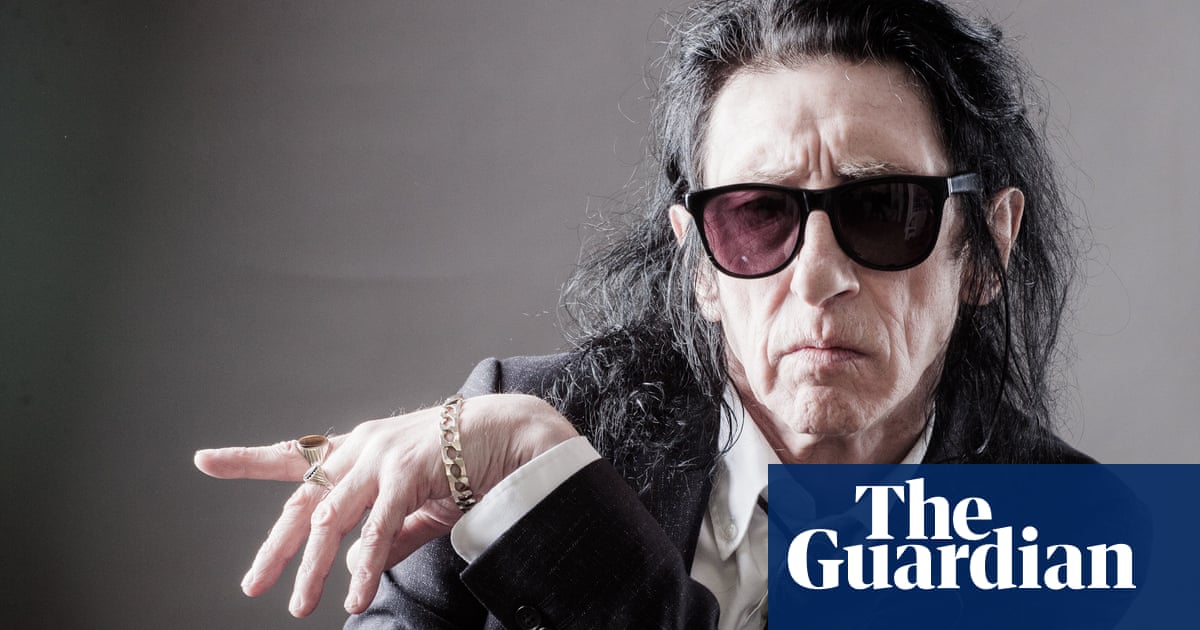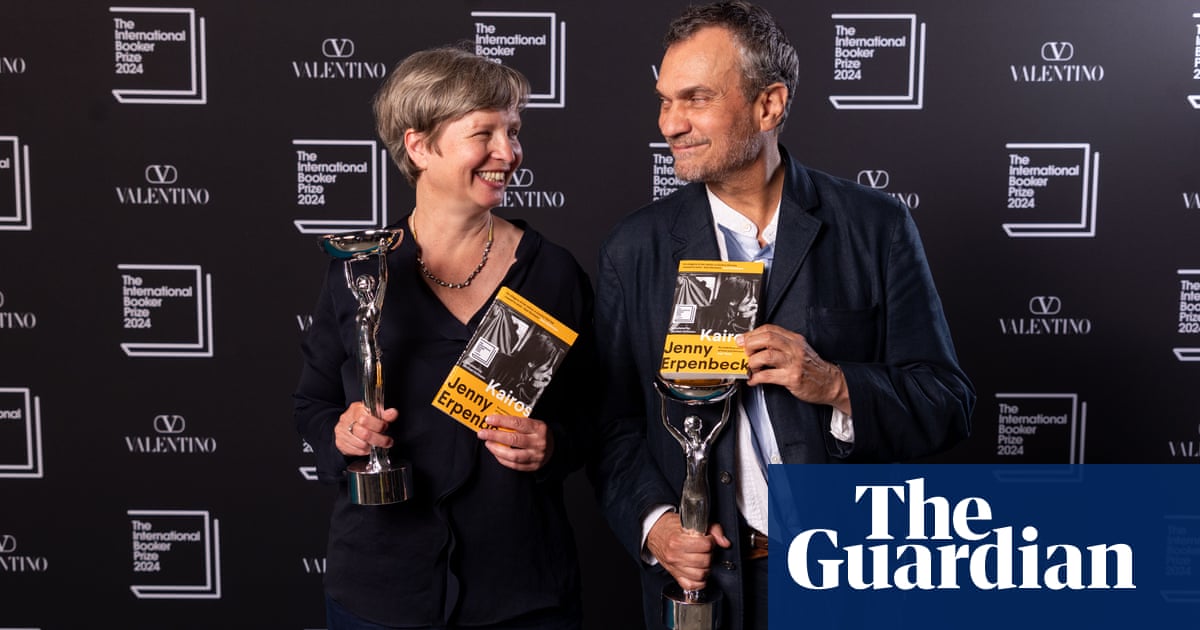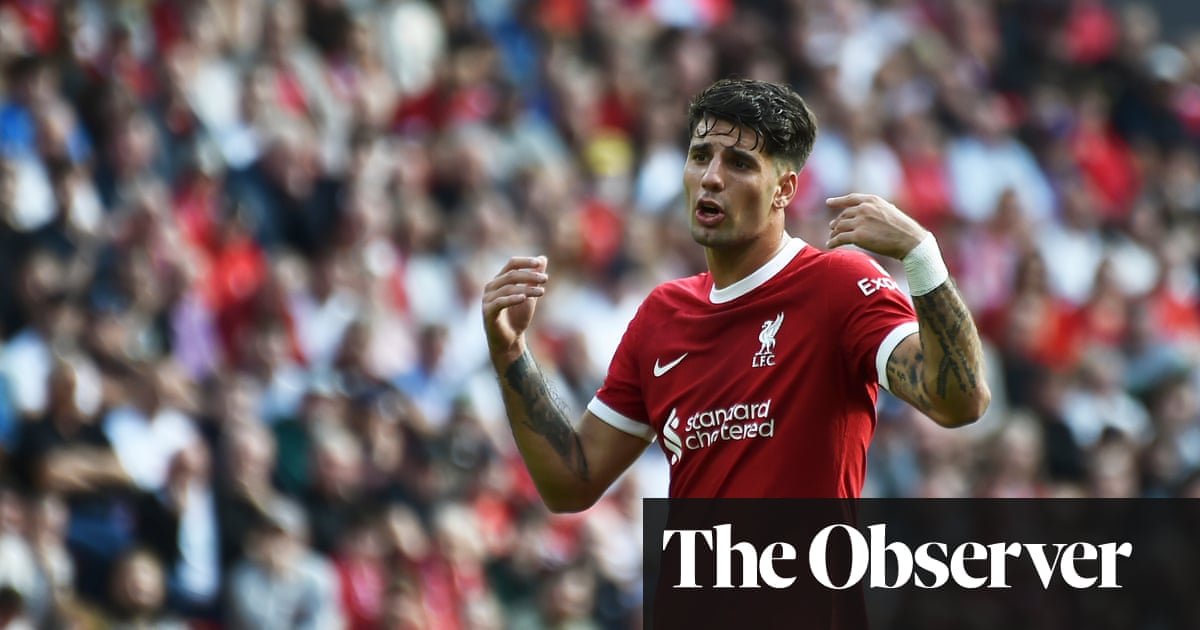
When Davina McCall was trying to get into telly, she auditioned for a presenting job on The Word, and they sent her into a studio to interview a then unknown boyband called Take That. It was the early 90s and we were going through “a phase of ‘mean telly’,” she says today. Presenters were expected to sneer at pop stars with an ironic detachment that didn’t come naturally to McCall. “The producers told me to take the piss out of them. They said, ‘I want you to go in there and be a bit edgy.’ But I couldn’t do it!” She returned to her day job as a booker for male models and her night job as a club hostess, bemoaning her “unfashionable” niceness. “But what’s quite funny is, whenever I bump into Robbie or Gary these days, they all remember. They’d been abused by hopefuls interviewing them all day, so they remembered me, the one who’d been kind. Which is, well, quite funny, isn’t it?”
Walking through a member’s club inside the former BBC Television Centre with McCall feels like I’m accompanying the actual sun. Staff, strangers, other celebrities, it’s wild: everybody’s face lights up as we approach, everybody greets her with an outrageous smile, and a compliment, and continues somehow brighter. We find a sofa by a long window. She props a cushion on her lap “so that you don’t have to look at my pants,” and tells me, merrily, the story of her life, a life studded with abandonment, addiction and the relentless pursuit of joy.
Today she is one of the most famous TV personalities in the UK. Last year she was presented with an MBE for services to broadcasting. For a long time she was best known as the beating heart of Big Brother and now she presents hit shows, including Long Lost Family (in which she reunites people with estranged relatives) and is a judge on the mad and brilliant The Masked Singer. “The thread between them is they’re all about making people happy!” But since her documentaries and award-winning book, Menopausing, she will no doubt be remembered for her new role as a guru of midlife, at 56. “I have to admit,” she grins, “it’s a mistake. In fact, most of my career has been stuff I haven’t really meant to do.”
McCall got her job in the nightclubs because, as a failed pop singer, she knew a lot about music and because, as a model booker, they thought she’d bring beautiful people. She got her first job with MTV hosting celebrities because she was so much fun at the clubs. She pestered MTV for work for three years after that, at the same time getting deeper and deeper into drugs – first cocaine (she took her first line with her mother) and then, in her 20s, heroin.
One day her best friend, Sarah, locked her in the car and said she had to stop. “You’re the topic of conversation at every dinner party,” Sarah said. McCall choked. The next evening, she went to a Narcotics Anonymous meeting where they taught her how to heal and then how to live. She was 24, six months clean when she finally had the MTV audition she’d been scrabbling for, and got the job. Three years later, in her first flush of fame, she was interviewed for a newspaper. “I divulged a lot more than I’d wanted to without understanding how it might be portrayed. I told them all about my drug taking. I wasn’t quite prepared for the public reaction. But again, it was a bit of a Sliding Doors moment because, actually, lots of people said thank you. And I was like, what?” Something clicked. Though the experience had been painful and horribly exposing, she saw the impact her honesty could have.
In 2000, she started presenting Big Brother and thrived there for 10 years in the role of an enthusiastic mother bear, hugging contestants tightly as they emerged into their new realities. But the job came with a new kind of fame. “I used to go round every roundabout twice to see who was following me.” The tabloids nipped at her. She had a son and two daughters with her then-husband Matthew Robertson, and she worried for their safety. “The papers have taken me down and lifted me up. I’ve had everything thrown at me. Like, I was a bit frightened that my career was over after the chatshow thing.”
This was 2006, a chatshow called Davina, a programme that helped BBC1 record its worst ever peak-time ratings and a project that McCall said was “the worst mistake of my life”. “It was quite intense, because they were saying, ‘Her career’s finished.’ And I thought, ‘Oh, please don’t let it be finished, because I love what I do.” Later she bumped into one of the reporters who’d made a career out of writing about her and he casually apologised. “He went, ‘Well, you’re all right now aren’t you?’” She looks a little stunned.
“In the documentary about Jade Goody, they said the same thing. They mocked her until they saw the public were on her side, then they were like, ‘OK, time to change it up!’ That’s when I saw it’s just a game.” And as time passed she realised, “I need the papers. Especially if I want to correct a story. It happened recently when people were saying we’re over-medicalising menopause. I tried, using the nicest words possible, to say that the women who really struggle [with menopause] would disagree with you. But to do that,” she looks up at me, “I need the papers not to hate me.”
McCall was 44 when she first started noticing signs of perimenopause: hot flushes, sleeplessness. Her first feeling was an unfamiliar shame. “I didn’t want to get old,” she says, in an embarrassed whisper. “But I see it so differently now. It’s like a gift.” Her grandmother used to call menopause “the change”, “which I love, because it’s where you transition from one era of your life to the next. Part of my menopausal journey was that I wanted to reframe the way society viewed menopausal women.”
In her first documentary about menopause, McCall spoke to women and medical experts, trying to dispel myths and eradicate stigma. After it aired, doctors were “inundated” with requests about HRT, and private healthcare firm Bupa reported a threefold rise for its menopause service. When McCall started learning about menopause, her first thought was, “Holy shit, how can I have got to this stage and no one’s told me this stuff?” Her second was, “So, I’ve got to tell everybody.” Recently, on holiday in Ibiza, somebody asked her what she did. “And on the spur of the moment I just changed my job title to ‘amplifier’. I thought, Of course, this is what I do. I take other people’s great ideas and amplify them.”
Another documentary and bestselling book later, she says, “I live and breathe the menopause.” Now she’s expanding her gaze to look at midlife through a wider lens. She’s starting a podcast on Steven Bartlett’s platform about navigating your 40s and 50s, looking at things like money, spirituality, forgiveness, guilt, health, longevity and career. “What’s interesting is that a lot of men at 50 go into crisis. They find it harder going into the latter stages of life than women do, because of the expectation of having to achieve something. I think that’s why the suicide rate is so high for men. Whereas women go through this awful bit in the middle, but with a bit of the right support it’s like, ‘Oh, what could I do next?’ It’s amazing.”
It’s funny, even when discussing suicide her tone is bright and her enthusiasm pointed. “You do not want to be in a place where you are like, ‘meh’, in midlife. That is a dangerous place to be.” Why? “Meh is inaction. It’s no purpose. That’s when you get depressed.” Has she ever felt meh? “No! Is that bad?” She thinks for a second. “At 50, I did have a year of, ‘God, what am I doing? Who am I? Where am I going?’” This was six years ago – she was going through a divorce, yet to start a relationship with her current partner (and then-hairdresser), Michael Douglas. “I was in France, on a morning run, and I realised it was seven years since my sister died. They say that at seven years you have another really massive wave of grief.” And what did she do? “I do what I do, which is: I throw everything at it.” She called her therapist, she called her friends, she called a business mentor, she pulled herself through it, out of “meh”, towards, maybe, “yeah”?
This is how McCall approaches life, as if it’s a series of fascinating escape rooms, each one requiring education, enthusiasm and positivity. “Lots of people get really annoyed with self-help stuff. I fucking love it. I might read something on Instagram that will change my fucking life! Makes my kids hate me, though, because I send them relentless amounts of self-help memes.”
What does she remember seeing that changed her life? “I was in my early 40s,” she says, dead serious now. “A black and white image of a little girl, jumping in a puddle, in her pants, in the rain. She looks ecstatic. And it said, ‘Remember her? She’s still in there somewhere. Why don’t you go get her?’” She looks suddenly teary. “I was like, fuck. I had turned into such an old person – a responsible and sensible mum. I was just beginning to hit perimenopause and starting to lose a bit of joy. I was flatlining.”
The meme pulled her out. “It lit a pilot light in my tummy. So that’s what I mean by self-help. It will talk to you.” Recently, on Instagram, she shared a video with the caption, “I’ll probably regret posting this.” It was a response to online comments that McCall was “too skinny”. “I was absolutely furious. I wasn’t hurt or upset. What made me angry was, this is the kind of stuff that could make someone want to go and change their face.” She pauses. “You know, I have considered that and I don’t judge anybody for doing it, but – I wouldn’t look like me any more.”
McCall believes she manifested her midlife dating series, My Mum, Your Dad. This is the glorious show in which grownup children of single parents take them to a big house in the countryside and encourage them to fall in love with each other. When she had the idea, already deep into her own midlife love affair, she called the commissioner of ITV directly and pitched it, hard. After a first series that was equal parts poignant and hilarious, the second series airs this month. Critics have drawn comparisons to Love Island. “But think about that Love Island age group. They don’t have any baggage. It’s so simple for them.” Here, the new couples are in their 50s and navigating grief, parental responsibility, trust issues. The stakes are infinitely higher.
Did she find it difficult starting a new relationship in her 50s? “I think a lot of the problems with people that meet then for the first time are about trust. But I’d known Michael for 20 years, and because we were hairdresser and client, we’d already gone deep.” Still, filming this series (in the first, one of the single men asked, on camera, if a date with Davina was “off the table”) she found herself jealous. “Halfway through the retreat, I thought, ‘Fuck me, I’d pay to come here if I was single.’ They were getting really good workshops every day. About self-acceptance, about forgiveness, about letting go. All useful life tools if you want to try to foster a healthy relationship later in life, which I think is really fucking hard if…” If what? “If you’ve been damaged.”
When McCall was three, her mother dropped her off at her paternal grandparents’ house in Surrey. Nobody explained that this would be the start of her new life. She stayed in regular contact with her father after that, but only saw her French mother, Florence, sporadically, on rare holidays in Paris. “I think I was quite out of control when I was a kid,” she says. Her mother was, she says, flamboyant and glamorous, but unsuited to motherhood. McCall remembers trailing behind her as she flashed passersby, naked beneath her coat. They first took drugs together when McCall was 12. “I can now, in hindsight, appreciate that she was a pretty fucking exciting person,” she pauses. “She just wasn’t a brilliant mother.” McCall found her life split in half. “I was two completely different people and I knew they could never meet – I couldn’t tell my granny what happened in Paris, because she might not let me go back.”
After a period of estrangement she reconciled with her mother just before her wedding to Robertson. But soon after, Florence sold a story to the tabloids about McCall going to a Narcotics Anonymous meeting, implying she was about to relapse, and then sold photos of their honeymoon. They never spoke again; Florence died in 2008. Recently, McCall was at a party and “everybody was dancing and it made me think of my mum. So I said to Michael, you would have loved her. And he said, I’ve met her. He went, ‘She’s in here’, and he put his hand on my heart. I was like, fuck. It was like I’d been denying my mum’s existence in me for all those years.” She swallows. “He said, all the bits that I like about you, your naughty bits, your party bits, I feel like that’s your mum.” She holds her chest, remembering.
Soon after, she went to see her mother’s third husband Tynn, to say she was ready, finally, to hear about “her good side”. Returning home, she put a picture of her mum on their “table of death”, “Which sounds like a very sad thing, but it’s actually lovely. In our bathroom, we have a table of death and every time we get out of the shower, we can see the people we’ve loved and lost smiling at us. And she’s on there now, rolling a joint, wearing a belt buckle that says, ‘I’m the boss’.” For McCall’s birthday last year, Michael found her the same belt buckle – a few weeks ago she wore it to collect her first French passport.
“One thing Tynn talked to me about was the fact my mum had a full hysterectomy at 28. I asked if she ever took HRT, and he was like, no, they just didn’t do that.” A kind of understanding dawned. “My mum was already into pills and drinking. This must have supersized her addiction to try to cope with it. And I thought, how is it that I’ve worked in this field so long and it’s only now I’ve thought about that?” There’s a sense of fate to this, a little shiver.
Her next book will be called Birthing. “It feels a bit weird doing a book about giving birth now, when my oldest kid is 22. But after menopause, I thought, ‘What is the next thing that I want to talk about?’ It’s the other area where women don’t know all the facts and can be very easily led.” This is also another area of women’s life that is shrouded in politics, and yet, in that merry TV presenter way, McCall maintains a doggedly apolitical stance. “Yes, I have stayed purposefully apolitical in public. But it’s so that I can lobby successfully. I want to be able to talk to everybody.”
She’s clearly gearing up to do for birth what she’s done for menopause, ripping away taboos and forcing women’s healthcare again into the headlines. If there’s one job she envies, she says, it’s Emma Willis’s Sky show, where she helps deliver babies. “It’s a privilege to be at someone’s birth and it’s a privilege to be at someone’s death. And I feel like I’m quite good at it.” McCall was there for both the death of her sister, Caroline, who died of cancer at 50 in 2012, and her father, Andrew, who died in 2022.
The key to helping people in death, she tells me, is to pinpoint who they were in life. For both her sister and father, she spent hours holding their hands and reassuring them that everyone they loved was going to be fine, that they could let go. “And I spend a lot of my time now telling the people I love what a fucking great life I’ve had. So that if something were to happen to me suddenly, they’d know – I’ve loved my life.” This is a midlife thing too, a new focus on the fact of an ending. “It doesn’t frighten me.” So when someone’s there at the end, squeezing her hand, I wonder, what will they be saying to her? “Thank you?” she hopes, with a sparkling grin. “Or – they might be squeezing my hand and going, ‘Davina, now will you shut the fuck up?’”
My Mum, Your Dad starts on 16 September on ITV1 and ITVX












